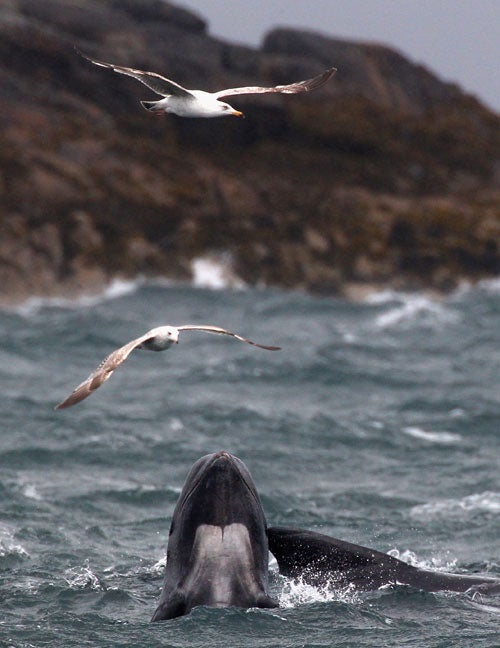Fears for whales as they return to shallows of loch
Pod headed out to sea, but last night came back and now risks mass stranding

A pod of 60 pilot whales retraced its path back to a Scottish loch last night, scuppering hopes that it had been successfully moved on to safety. Rescuers had been confident that a mission to move the mammals to deeper waters off Scotland's north-west coast had been successful. But last night, they were dismayed to see the pod swim back to Loch Carnan, a remote stretch of water in South Uist which is dangerously shallow for whales.
It is suspected at least one of the animals has already died and there are heightened fears of a potential mass stranding killing many more. Up to 20 already have injuries to the head.
The whale pod first appeared in the loch on Thursday, but members of the British Divers Marine Life Rescue (BDMLR) had been heartened by seeing them move into the open water yesterday.
Dave Jarvis, of the rescue team, said: "Unfortunately the pod of pilot whales that it was hoped were moving away from the Scottish sea loch earlier have now returned to their original location. The animals were observed and disappointingly they retraced their route back into the loch.
"The whales do not currently appear to be agitated. Sadly, it is thought that one of the animals may now have died as a body has apparently been seen in the water."
Rescuers are desperate to avoid a repeat of last November's tragedy, when 33 long-finned pilot whales swam close to the same island and died three weeks later after a mass stranding off the coast of Donegal.
"One theory is that they are arriving here in search of food," said Mr Jarvis. "But it is becoming increasingly a concern, especially in the wake of what happened in Ireland. We will be careful to ensure that history does not repeat itself."
Divers and rescuers remain on stand-by with inflatable pontoons, in case any of the whales should break away from the group. Local fishermen had also tried to guide the whales back into deeper water.
Pilot whales are among the most common cetaceans – the adult male growing up to 20ft long and weighing up to 3.5 tons. They have extremely strong social bonds, which means healthy whales within the pod are more likely to follow sick and injured whales on to the shore.
Mr Jarvis added: "The Scottish government has offered the use of the fisheries protection vessel EPV Hirta to shadow the animals' movements, and this offer has been accepted."
Join our commenting forum
Join thought-provoking conversations, follow other Independent readers and see their replies
Comments